Overview
of projects in The Democratic Republic of the Congo
The people of the DR Congo have suffered continuously for many years due to the devastations of civil war, disease, famine, and poverty. The aim of TFI members working in the Congo has been to offer tangible solutions to alleviate the poverty, as well as provide spiritual healing and hope for a brighter future.
Members have conducted mission work in the DR Congo for two decades. Volunteers transported several containers of humanitarian aid, which were distributed to the most needy, including the Pygmies. Services TFI volunteers have offered include provision of health care; education and training for orphaned and underprivileged youth; micro-enterprise incubation; Christian counseling; Bible study groups, and missionary training.
Our goal is to infuse God’s love and faith into every sphere of society, to help mend broken lives and rebuild this beautiful country one heart at a time.
Project Highlights
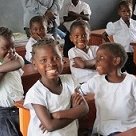 Education and Enrichment activities
| Espoir Congo built a primary school, then a middle school, in Kikimi, on the outskirts of Kinshasa, and set up a library. To address the need for holistic education, opportunities are provided for the children to participate in group sports, go on field trips, and engage in activities with art, drama, music and group discussion, in a positive Christian-based learning environment, such as the STEPS Program, which is being translated into French. TFI members have also built schools in other parts of the country, such as Kasai.
Read more
Education and Enrichment activities
| Espoir Congo built a primary school, then a middle school, in Kikimi, on the outskirts of Kinshasa, and set up a library. To address the need for holistic education, opportunities are provided for the children to participate in group sports, go on field trips, and engage in activities with art, drama, music and group discussion, in a positive Christian-based learning environment, such as the STEPS Program, which is being translated into French. TFI members have also built schools in other parts of the country, such as Kasai.
Read more
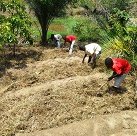 Development aid: Agriculture, Water, Electricity
| Every TFI missionary who has ministered in the DRC has been gripped by the suffering and ongoing poverty of the common people, due to decades of war, corruption, disease, and lack of infrastructure. Preaching the gospel had to start with offering practical solutions, such as bringing water and electricity and encouraging the development of agriculture.
Read more
Development aid: Agriculture, Water, Electricity
| Every TFI missionary who has ministered in the DRC has been gripped by the suffering and ongoing poverty of the common people, due to decades of war, corruption, disease, and lack of infrastructure. Preaching the gospel had to start with offering practical solutions, such as bringing water and electricity and encouraging the development of agriculture.
Read more
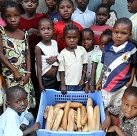 Food Distribution
| Children being the first victims of poverty, most particularly in the DRC where thousands roam the streets, both inflicting and suffering abuse, TFI’s efforts first focused on supplying food to orphaned and underprivileged children.
Read more
Food Distribution
| Children being the first victims of poverty, most particularly in the DRC where thousands roam the streets, both inflicting and suffering abuse, TFI’s efforts first focused on supplying food to orphaned and underprivileged children.
Read more
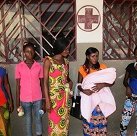 Health Care and Maternity
| Espoir Congo’s first aid outpost, set up in 2010, expanded in 2013 into a full-fledged medical care centre with a maternity unit, providing free medical diagnosis, treatment, and medication to orphaned and underprivileged children, and offering highly subsidized medical care to the village population, including pregnant women, the biggest need being early detection of malaria and typhoid, as well as prenatal care and childbirth.
Read more
Health Care and Maternity
| Espoir Congo’s first aid outpost, set up in 2010, expanded in 2013 into a full-fledged medical care centre with a maternity unit, providing free medical diagnosis, treatment, and medication to orphaned and underprivileged children, and offering highly subsidized medical care to the village population, including pregnant women, the biggest need being early detection of malaria and typhoid, as well as prenatal care and childbirth.
Read more
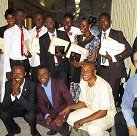 Leadership Training
| One of TFI’s long-term goals has been to teach and train Christian disciples and leaders. To this effect, TFI missionaries conduct an ongoing Bible-based leadership training program, which includes the development of interpersonal and team building skills for young Congolese, with the goal of eventually nationalizing the work. Ongoing training via retreats and seminars enables them to teach their own group of students and to develop the missionary activity of their choice, be it hospital visitation, inmate rehabilitation, disaster relief, or protection of human rights, including distribution of Christian literature.
Read more
Leadership Training
| One of TFI’s long-term goals has been to teach and train Christian disciples and leaders. To this effect, TFI missionaries conduct an ongoing Bible-based leadership training program, which includes the development of interpersonal and team building skills for young Congolese, with the goal of eventually nationalizing the work. Ongoing training via retreats and seminars enables them to teach their own group of students and to develop the missionary activity of their choice, be it hospital visitation, inmate rehabilitation, disaster relief, or protection of human rights, including distribution of Christian literature.
Read more
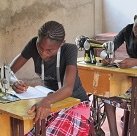 Empowerment of Women and Micro-enterprise Schemes
| Espoir Congo’s efforts enable needy young people and women to start their own business ventures and thereby pay for their studies and/or support their families. Free vocational training in tailoring and literacy classes are offered to girls who did not receive sufficient education, which continues to be an ongoing challenge in the DRC.
Read more
Empowerment of Women and Micro-enterprise Schemes
| Espoir Congo’s efforts enable needy young people and women to start their own business ventures and thereby pay for their studies and/or support their families. Free vocational training in tailoring and literacy classes are offered to girls who did not receive sufficient education, which continues to be an ongoing challenge in the DRC.
Read more